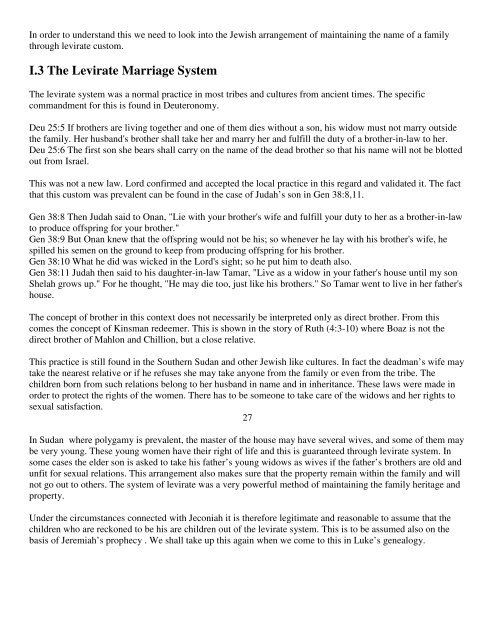Genealogy of Jesus
You also want an ePaper? Increase the reach of your titles
YUMPU automatically turns print PDFs into web optimized ePapers that Google loves.
In order to understand this we need to look into the Jewish arrangement <strong>of</strong> maintaining the name <strong>of</strong> a family<br />
through levirate custom.<br />
I.3 The Levirate Marriage System<br />
The levirate system was a normal practice in most tribes and cultures from ancient times. The specific<br />
commandment for this is found in Deuteronomy.<br />
Deu 25:5 If brothers are living together and one <strong>of</strong> them dies without a son, his widow must not marry outside<br />
the family. Her husband's brother shall take her and marry her and fulfill the duty <strong>of</strong> a brother-in-law to her.<br />
Deu 25:6 The first son she bears shall carry on the name <strong>of</strong> the dead brother so that his name will not be blotted<br />
out from Israel.<br />
This was not a new law. Lord confirmed and accepted the local practice in this regard and validated it. The fact<br />
that this custom was prevalent can be found in the case <strong>of</strong> Judah’s son in Gen 38:8,11.<br />
Gen 38:8 Then Judah said to Onan, "Lie with your brother's wife and fulfill your duty to her as a brother-in-law<br />
to produce <strong>of</strong>fspring for your brother."<br />
Gen 38:9 But Onan knew that the <strong>of</strong>fspring would not be his; so whenever he lay with his brother's wife, he<br />
spilled his semen on the ground to keep from producing <strong>of</strong>fspring for his brother.<br />
Gen 38:10 What he did was wicked in the Lord's sight; so he put him to death also.<br />
Gen 38:11 Judah then said to his daughter-in-law Tamar, "Live as a widow in your father's house until my son<br />
Shelah grows up." For he thought, "He may die too, just like his brothers." So Tamar went to live in her father's<br />
house.<br />
The concept <strong>of</strong> brother in this context does not necessarily be interpreted only as direct brother. From this<br />
comes the concept <strong>of</strong> Kinsman redeemer. This is shown in the story <strong>of</strong> Ruth (4:3-10) where Boaz is not the<br />
direct brother <strong>of</strong> Mahlon and Chillion, but a close relative.<br />
This practice is still found in the Southern Sudan and other Jewish like cultures. In fact the deadman’s wife may<br />
take the nearest relative or if he refuses she may take anyone from the family or even from the tribe. The<br />
children born from such relations belong to her husband in name and in inheritance. These laws were made in<br />
order to protect the rights <strong>of</strong> the women. There has to be someone to take care <strong>of</strong> the widows and her rights to<br />
sexual satisfaction.<br />
27<br />
In Sudan where polygamy is prevalent, the master <strong>of</strong> the house may have several wives, and some <strong>of</strong> them may<br />
be very young. These young women have their right <strong>of</strong> life and this is guaranteed through levirate system. In<br />
some cases the elder son is asked to take his father’s young widows as wives if the father’s brothers are old and<br />
unfit for sexual relations. This arrangement also makes sure that the property remain within the family and will<br />
not go out to others. The system <strong>of</strong> levirate was a very powerful method <strong>of</strong> maintaining the family heritage and<br />
property.<br />
Under the circumstances connected with Jeconiah it is therefore legitimate and reasonable to assume that the<br />
children who are reckoned to be his are children out <strong>of</strong> the levirate system. This is to be assumed also on the<br />
basis <strong>of</strong> Jeremiah’s prophecy . We shall take up this again when we come to this in Luke’s genealogy.


















